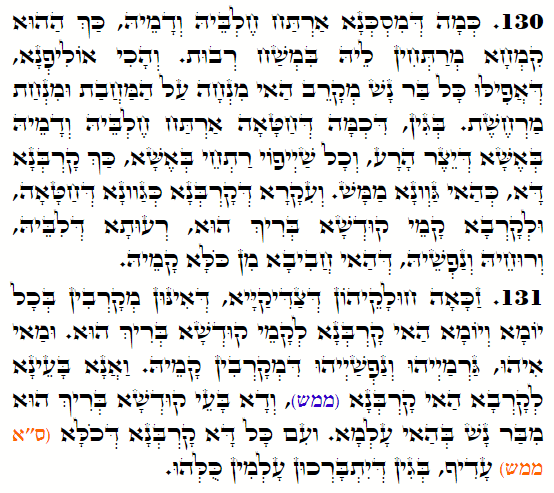Daily Zohar # 3893 – Vayikra – Offer your fat and blood for purification
Daily Zohar 3893

Hebrew translation:
131. אַשְׁרֵי חֶלְקָם שֶׁל הַצַּדִּיקִים שֶׁמַּקְרִיבִים בְּכָל יוֹם וָיוֹם אֶת הַקָּרְבָּן הַזֶּה לִפְנֵי הַקָּדוֹשׁ בָּרוּךְ הוּא. וּמַה הוּא? עַצְמָם וְנַפְשָׁם שֶׁמַּקְרִיבִים לְפָנָיו. וַאֲנִי רוֹצֶה לְהַקְרִיב אֶת הַקָּרְבָּן הַזֶּה (מַמָּשׁ), וְזֶה רוֹצֶה הַקָּדוֹשׁ בָּרוּךְ הוּא מֵאָדָם בָּעוֹלָם הַזֶּה. וְעִם כָּל זֶה, קָרְבָּן שֶׁל הַכֹּל (מַמָּשׁ)עָדִיף, כְּדֵי שֶׁיִּתְבָּרְכוּ כָּל הָעוֹלָמוֹת.
.
Zohar Vayikra
Continued from previous DZ
#130
The meal offering, flour brought to the priest, is boiled in a pan with good oil. It represents the state of a poor person when his fat and blood are burnt under conditions of hunger.
We learned that others could bring meal offerings in a pan or a pot because the sin is like the offering, burns in the body with the fire of the evil inclination. The Holy One Blessed be He favors it when a person brings his heart, mind, and soul as a sacrifice to him.
#131
Blessed is the portion of the Tzadikim that brings this kind of sacrifice every day before the Holy One Blessed be He. They ‘burn’ themselves and their souls with the desire to connect to Hashem. Yehuda ‘the other’ said, I want to make this sacrifice because that is what God wants from us in this world. Nevertheless, animal sacrifices are much better because all the worlds are blessed by them.
Lesson;
Repententence should be done on the levels of body and soul. The soul with its levels of Nefesh (Liver, blood), Ruach (Heart, determination), and Neshama (Mind, consciousness) should lead the repentance process with a promise not to repeat the negative deeds of the past.
The fasting that comes with repentance is the sacrifice we offer for atonement. When we give from our body, fat, and blood, Hashem sees our soul without the ‘gravity’ of the body.
If during a fast for spiritual elevation a person gets occupied with thoughts about food rather than the purpose of the fast, he should make efforts to focus on the spiritual aspects of the fast. If a person is weak during fasts, it would be better not to fast at all and instead dedicate time studying Torah.
The road to spiritual purity is not easy, and we have to give from ourselves to climb up. Tzedakah can replace a fast by giving the value of one meal or one full day of meals. Each according to their abilities.
{||}

 Previous: Vayikra
Previous: Vayikra
